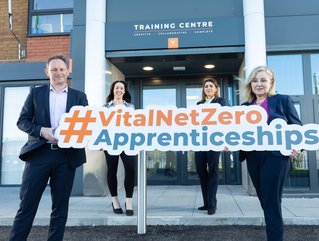Vital Energi partners with City of Liverpool College

Vital Energi has partnered with The City of Liverpool College for the second year to deliver bespoke renewable energy and heat network apprenticeship programmes across the country.
Scaling up heat networks and generating energy from renewable technologies is at the heart of the Government’s plans to boost the UK’s energy security and achieve the country’s Net Zero target by 2050. To achieve this, 18% of heat will need to come from heat networks, but connections to heat networks today represent just 2%.
Vital – which has over 30 years’ experience in delivering heat networks – is joining forces with The City of Liverpool College, which will deliver the curriculum from the £2mn Training Academy located at Vital’s Blackburn headquarters, for two pathways: Craft and Technical.
Both pathways will enable apprentices to learn and work within the renewable energy and heat networks market. They will discover how energy is generated and distributed, and how to manage and reduce consumption for residential and commercial clients. Apprentices will also learn how carbon emissions are reduced through Vital’s renewable technologies.
The initiative demonstrates the organisations’ commitments to developing the key industry skills required to achieve net zero and create a sustainable energy workforce.
Liverpool City Region has an ambition to reach net zero carbon by 2040 and The City of Liverpool College is focussed on developing its curriculum around the needs of industry, creating a workforce for the future by developing the skills needed to enter the world of work in sustainable careers.
Lindsey Meadows, Head of Apprenticeships at The City of Liverpool College, said its partnership with Vital Energi is built on the knowledge and skills of its engineers and our innovative curriculum leaders at The City of Liverpool College, and the programmes will provide apprentices with the skills they need to enter the workforce.
The programmes will be delivered via a blended mix of virtual online teaching and a minimum of 25 days curriculum learning each year within the Training Academy. Apprentices will spend the majority of their time on-site working on real projects, where they will pick up a wealth of skills through hands-on experience and support from Vital’s team.
During the three-year Craft programme, apprentices will study for a Level 3 Building Services Engineering Craftsperson qualification. They will learn a range of key skills from pipework fabrication and jointing techniques such as electro fusion jointing, to welding, the installation of plumbing and heating systems, and more.
At the end of the Technical programme, apprentices will achieve a Level 3 Building Services Design Technician qualification, after developing their understanding of building services design principles.
Harvey Hudson, Technical Apprentice, said as well having a better understanding of the job and career, spending time in a variety of departments has broadened his industry knowledge and the many different aspects required for a successful project, which will allow him to "hit the ground running".
Chris Roach, a site-based Project Manager at Vital Energi, started his career journey at The City of Liverpool College when he was 18 years old, where he completed a four-year Mechanical Building Engineering apprenticeship. He studied Building Services Engineering in the first two years before focussing on Mechanical Building Services Engineering in the last two.
As well as achieving a HND, Roach won the North West HVAC Student Engineer of the year in 2005, and the National CIBSE HVAC Student Engineer of the year in 2005.
Roach said his time as an apprentice provided him with a wealth of skills through hands on experience and support from tutors, and allowed him to pursue his career path.
“Here at Vital, we’re working on exciting projects across the whole of the UK to help our clients reach net zero," he said, adding it has connected over 82,000 homes to heat networks.






